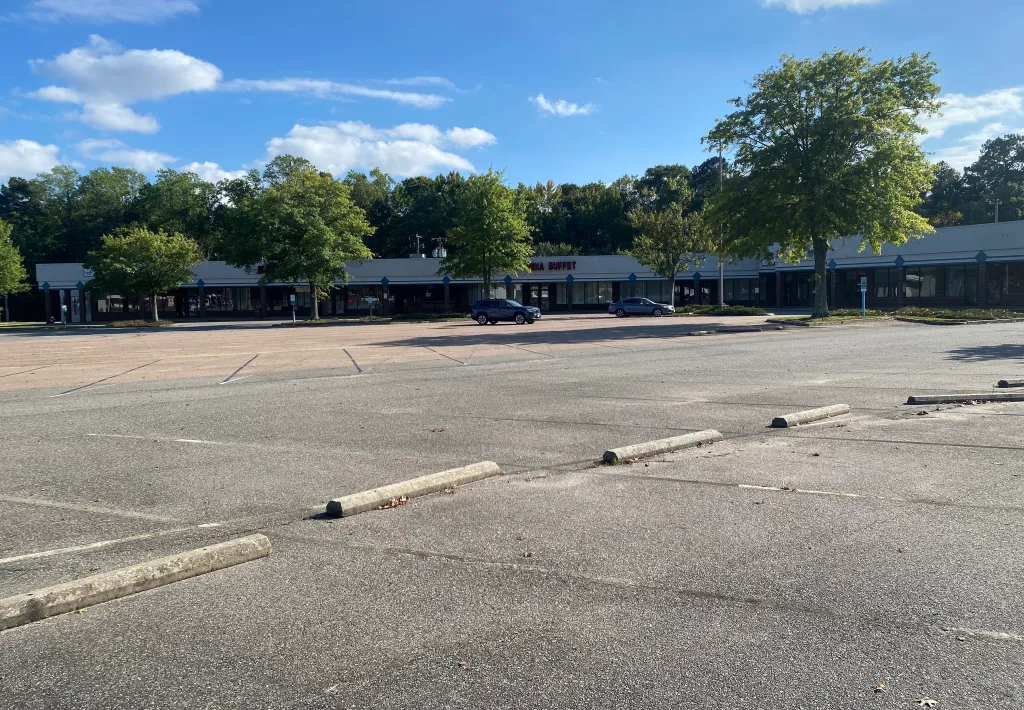
NEWPORT NEWS — A Virginia lawmaker says she wants to pursue a statewide ban of mandatory parking requirements for new developments, which housing advocates say could help solve Virginia’s affordable housing crisis.
“Oftentimes, these excessive parking requirements are used as a way to block any development, even if it is benefitting community as a whole,” said Laura Dobbs, policy director at HOME of Virginia, at a news conference Monday. “Eliminating parking mandates doesn’t mean there’s not going to be any parking built.
“The builder is always going to do what the market is asking for, but it at least allows them to tailor the project to what those needs are, what is necessary for this, rather than just being another administrative requirement or red tape that is a block towards getting the housing we need.”
Del. Shelly Simonds, a Newport News Democrat, said if reelected, she plans to sponsor a bill that would repeal parking requirements in a manner adopted by several Virginia cities, including Richmond and Newport News.
Simonds said it would make things easier for new retailers as well.
“It’s really important in terms of streamlining the permitting process, making it easier for businesses to open,” she said.
Virginia lawmakers included a proposal to eliminate or reduce parking minimums for housing developments as part of a broader housing bill this year, but it did not pass the Senate.
Recent polling from YouGov for the Commonwealth Housing Coalition shows housing is a top issue for Virginians, and most support the state legislature taking action. In Hampton Roads, 62% of the survey’s respondents said lawmakers should prioritize building more homes over leaving the power to decide what kinds of homes should be built and where to city governments.
Some municipalities have done away with requiring new developments to have a certain number of parking spots. Richmond, which got rid of minimum off-street parking requirements in 2023, cited affordable housing in the decision.
“The parking minimums have contributed to urban sprawl, lack of abundant and affordable housing, and automobile dependency,” concluded a staff report from Richmond’s Department of Planning and Development in it’s recommendation of the change. “Requiring parking spaces based on the number of dwelling units or floor area can directly increase the costs to residents and business owners.
“The space used for parking cars takes away space that could be used for additional housing.”
Brian Mercer, a planner with the city of Richmond, said the city’s previous parking minimums were antiquated and confusing.
“One of my favorites was if you had a bowling alley, you would have to provide five parking spaces per lane,” Mercer said. “But typically, like if a family goes, that’s one car. I’d ask people who have been here before me, and they’re like, oh yeah we just copied it over from some other locality in the ’60s or ’70s.”
Newport News got rid of the requirement last year. At the time, city officials said the repeal could bolster new businesses and housing developments.
It’s too soon to know how effective that’s been at allowing new development, including for housing, said Flora Chioros, Newport News’ assistant director of planning.
“At this point, I’ve seen some industry retail go into shopping centers that would have not been able to go in those places with our previous mandated parking,” Chioros. “I’ve also seen retailers come through and ask for many more spaces than would have been required.”
And though less parking doesn’t immediately equate to more housing, Chioros said there’s been some progress on that as well, particularly in downtown Newport News, which used to have mandated parking requirements for residential use.
“We have had some adaptive reuse of older buildings in our downtown area that are being currently remodeled for residential use, versus having to demolish them for a parking lot,” she said.
Chioros said she’s confident Newport News made the right decision.
“I do think that cities in general should be out of the parking-mandated business,” she said. “It is up to the developers to figure out how much they need. At the same time, especially in residential areas or in areas that don’t have on-street parking, that’s a challenge, so you’re still going to need some parking unless you have the infrastructure that allows for mass transit and pushing people in that direction.”
But there’s a potential downside.
“In our city ordinance, especially for retail uses, we used to have a minimum and a maximum (parking requirement), so you couldn’t go over the maximum,” Chioros said. “My fear is that by removing (the requirement) completely, we’re going to end up with much more parking than what we would have with that maximum, so I’m going to watch that a little bit.”
Kate Seltzer, 757-713-7881, kate.seltzer@virginiamedia.com



